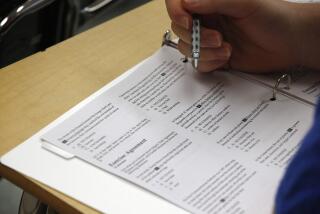New blow to SAT empire shows California’s key role in diminishing college admissions tests
- Share via
One by one, the California blows against the SAT and ACT kept coming.
First UC Berkeley announced last May that it wanted to disregard SAT and ACT test scores in admissions decisions for some students in a pilot study. The same day, University of California regents unanimously voted to phase out the tests over five years. After that, Caltech nixed them for at least two years. And in September, a California state judge ordered UC to immediately suspend all use of test scores in admissions.
Meanwhile, the COVID-19 pandemic leveled its own hits — upending the testing environment nationwide by severely limiting testing opportunities and prompting the massive California State University system and three-fourths of U.S. colleges to suspend testing requirements for fall 2021 applicants.
But when the College Board announced Tuesday that it was scrapping the SAT subject tests and optional essays to “reduce and simplify demands on students,” amid the pandemic, testing experts nationwide pointed to California as a prime accelerator in crippling this mainstay of the college admissions process for millions of students over the last half century. Because of the outsize influence of the state’s higher education institutions, some believe the SAT and ACT could be headed for eventual demise.
“California’s universities are playing national leadership roles in weakening the SAT/ACT in college admissions,” said Jay Rosner, executive director of the Princeton Review Foundation, a nonprofit advocate for fair testing. “Announcements of their test-free policies last spring led to dozens more colleges around the country becoming temporarily or permanently test free.”
The College Board, however, said the SAT remained popular and that it would be further revised to streamline the content and deliver digitally. In addition, the testing nonprofit said it would possibly expand testing opportunities this fall.
“There’s still a clear demand from students to take the SAT as a way to show their strengths to colleges,” the College Board said in a statement. “The pandemic has highlighted the importance of being innovative and adaptive to what lies ahead.”
Students can take the SAT with the essay through the June 2021 SAT administration. But both the essay and SAT subject tests — which assessed mastery of high school subjects including history, biology and math — have dropped out of favor with universities in recent years.
“The College Board is simply acknowledging the economically inevitable: the number of colleges and universities requiring either the SAT ‘essay’ or Subject Tests ... was rapidly declining pre-pandemic and was essentially zero in the current admissions cycle,” said Bob Schaeffer, public education director for FairTest, the National Center for Fair and Open Testing.
UC regents on Thursday discussed whether to go beyond phasing out the SAT and ACT and permanently drop the use of any standardized tests in admissions decisions but took no action.
Unlike UC, the Cal State system has not announced any plan to phase out the standardized tests. It’s also unclear whether the hundreds of colleges and universities that made the SAT and ACT optional amid the pandemic will revert to again requiring the tests.
But Michal Kurlaender, a UC Davis education professor, said California’s leadership in seeking alternatives to the SAT is sparking interest nationwide.
“As California goes, so goes the nation,” she said.
Kurlaender said she has been contacted by several states about her research showing that the Smarter Balanced K-12 assessment test used in California and a dozen other states does as good a job in predicting college success as the SAT with less racial bias.
Some K-12 administrators and college counselors hailed the decision as long overdue.
Lauren Cook, a college counselor at Jewish Community High School of the Bay and immediate past-president of the Western Assn. for College Admission Counseling, said it was well past time to drop the subject tests because they were required by few universities — mostly STEM-focused institutions. But in the last year, some of the elite institutions, such as Harvey Mudd and Caltech, dropped the requirement in order to reduce application barriers, she said.
“It was just adding to the stress and volume in the college applications process,” Cook said.
As a counselor, Cook said that the constant changes amid the pandemic to the SAT, ACT and AP test administrations as well as to university admissions policies have been “maddening.”
“Families definitely look to their college counselors to light the way and tell them how to make sense of all this,” Cook said. “With how rapidly things have changed, its sort of crazy-making for a counselor to try to stay on top of it and be able to synthesize what’s happening and give good advice in real time.”
At Lynwood Unified, where 91% of students are living in poverty, scrapping the SAT subject tests and essays is only the first step needed to remove barriers to college, said Supt. Gudiel Crosthwaite.
“Given the circumstances, canceling subject tests and the essay portion is the right thing to do, and colleges must revisit their admissions process to be inclusive and equitable,” Crosthwaite said.
But there also needs to be a broader discussion about the place of standardized within the college admissions process, he added. “Standardized testing and the College Board represent a multibillion-dollar industry that, although meant to support students, has reinforced and perpetuated inequities,” Crosthwaite said.
Many students still felt compelled to take a standardized test this year if they could. Hailey Heirigs, 17, a senior at Palisades Charter High School, believed a high test score would boost her chances of admission to a top university. Her family saved earnings from her father, a tattoo artist, to hire a student tutor for ACT prep. She began studying during the summer before her junior year.
“A lot of people have a 4.0 or above a 4.0,” Heirigs said. “If you don’t have that extra oomph … that extra number, it’s hard to stand out from the crowd.”
As the pandemic intensified, she was frustrated in attempts to take the test. After her spring and summer 2020 test dates were cancelled, she flew to Wisconsin in the fall in search of a test, only to find it, too, had been cancelled.
Cynthia Medrano, a college counselor at Alliance-Marine Innovation & Technology 6-12 Complex, a Los Angeles Unified charter school, wasn’t happy that the essay will be dropped because it gave many of her students who are not good multiple-choice test takers a chance to shine. She also raised concerns about the College Board’s development of an online SAT exam, questioning test security and fairness if it is administered in students’ homes.
“If I have a student who shares a room with three siblings and parents, how can we make this equitable?” she asked. “Maybe at home the WiFi is really bad or the student feels really uncomfortable or the parent … cannot give the student three hours without noise. We’re going to need to continue this education reform.”
Rosner, of the Princeton Review Foundation, said he plans to begin raising another potentially explosive issue about the SAT: Its founder, Carl Brigham, was a Princeton professor and supporter of the eugenics movement — a racist ideology that sought to use science to improve the human race by promoting traits deemed superior and breeding out those judged undesirable.
He believes the origins of the test cannot be dismissed.
Amid the nation’s intensifying racial justice movement, universities across the nation have removed the names of eugenics supporters from their buildings and honors — including Caltech, USC, Stanford and Pomona College. UC Berkeley last October disclosed it had discovered a $2.4-million eugenics research fund, frozen its use and launched a review into how the university could have accepted such a gift in 1975.
A College Board spokesman said the test today has been completely revamped to eliminate biased items, such as vocabulary and “esoteric math.”
Times staff writer Howard Blume contributed to this article.
More to Read
Sign up for Essential California
The most important California stories and recommendations in your inbox every morning.
You may occasionally receive promotional content from the Los Angeles Times.












